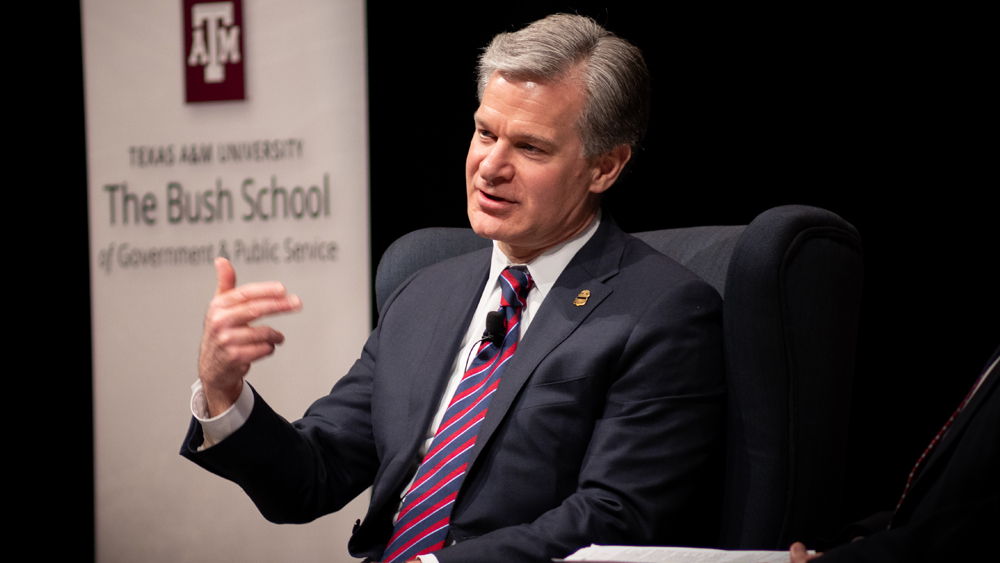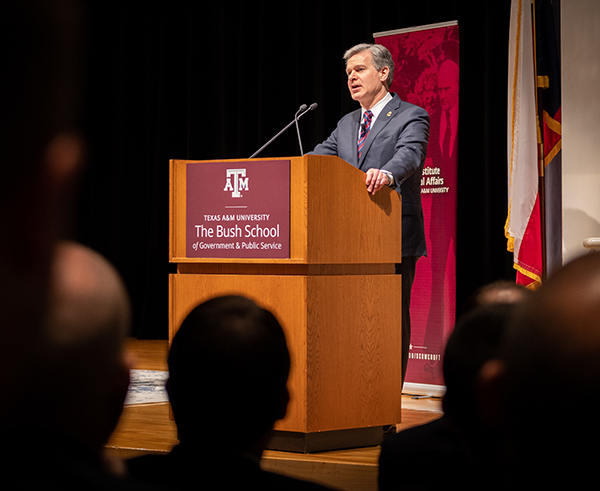
Christopher Wray reflected on the current threat landscape during a visit to Texas A&M’s Bush School of Government and Public Service.
By Caitlin Clark, Texas A&M University Division of Marketing & Communications
Note: This article originally appeared in Texas A&M Today on April 10, 2023
The national security threats facing the United States today are as complex and sophisticated as ever, FBI Director Christopher Wray said during a recent wide-ranging discussion at Texas A&M University.
To respond to challenges and stay ahead of the danger requires looking five to 10 years ahead in anticipation of where the threats are heading, he told the crowd during his April 5 talk hosted by the Bush School of Government and Public Service Scowcroft Institute of International Affairs. What Wray expects to see in the near future: hostile nation-states becoming more aggressive in their efforts to steal U.S. information, target critical infrastructure and interfere with democratic institutions.

“Front and center” of these threats, he said, is China. Wray discussed these and other pressing national security challenges, as well as the evolving threat landscape.
“There is no doubt that the greatest long-term threat to our nation’s ideas, our economic security and our national security is that posed by the Chinese communist government,” Wray said. “To be clear, that threat stems from the Chinese government, not the Chinese people themselves… the current Chinese regime will stop at nothing steal what they can’t create and silence the messages they don’t want to hear, all in an effort to surpass us as a global superpower and to shape a world order more friendly to their decidedly authoritarian regime.”
Wray spoke at length about China’s use of hacking as a pathway to “steal on a massive scale,” and thanked Texas A&M for the university’s efforts to convey the seriousness of cybersecurity. The threat will increase in sophistication and scale in the coming years, he said.
Meanwhile, the Iranian regime is also expected to continue to engage in what Wray called “brazen behavior” directed at the U.S., pointing to the alleged plot to kill former National Security Advisor John Bolton, a ransomware attack targeting Boston Children’s Hospital and efforts to influence the 2020 presidential election and undermine Americans’ confidence in the democratic system.
Wray said Russia also is carrying out “persistent malign influence operations” through a variety of cyber threats. But even as cybersecurity and nation-state threats loom large on the horizon, Wray said, terrorism remains the FBI’s top priority. For perhaps the first time in its history, the “tempo” of the FBI’s counterterrorism operations remains high simultaneously for international, state-sponsored and domestic terrorism.
On top of this, Wray said, technological advancements like artificial intelligence and facial recognition have made it easier to target U.S. citizens and their resources, while also making it more difficult for the FBI to collect evidence.
“There is no doubt that the greatest long-term threat to our nation’s ideas, our economic security and our national security is that posed by the Chinese communist government.”
FBI Director Christopher Wray
“I want to emphasize that the challenges I’m talking about here this evening are not insurmountable,” he said. “In fact, to meet them effectively, we’ll need the right tools. And most importantly, we need strong public institutions full of talented, innovative people ready to join the fight.”
Fittingly, the FBI currently employs 267 former students, with 161 Aggies working as special agents, Wray said.
Throughout the talk, Wray emphasized the importance of growing and maintaining a strong FBI workforce, and encouraged students to consider pursuing public service as they enter their careers.
“Now more than ever, we do believe as President Bush said and demonstrated, that public service is a noble calling,” Wray said. “I’m told that here at the home of the 12th Man, I’m in a place where people are used to and in fact look forward to jumping in and serving when called to do so. So Aggies, consider this your invitation.”

